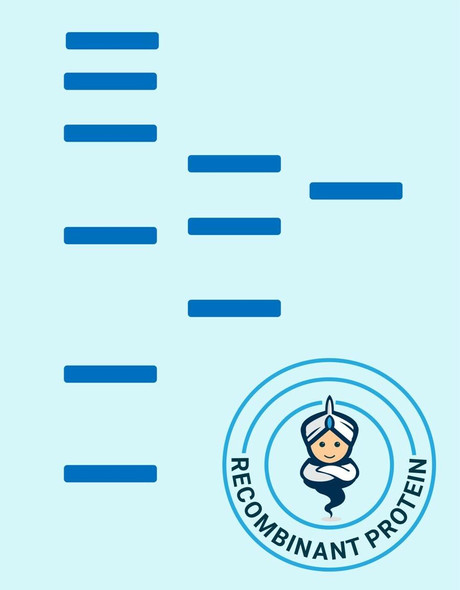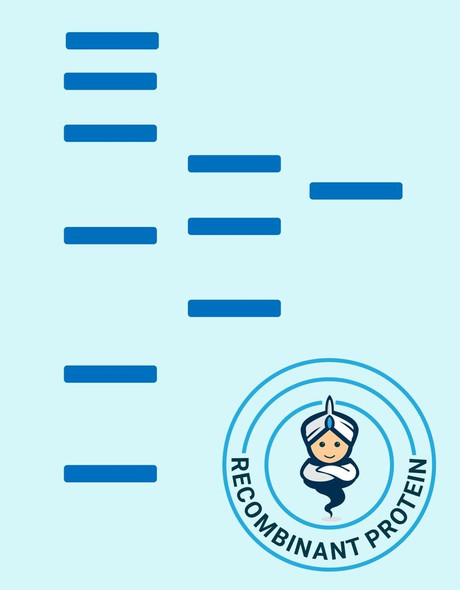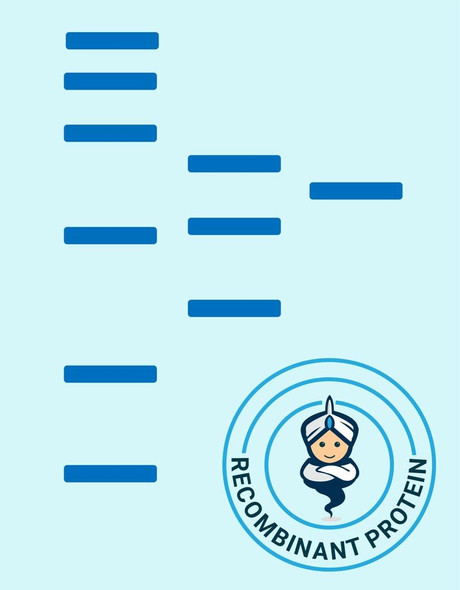Mouse GRO g Recombinant Protein (RPPB1153)
- SKU:
- RPPB1153
- Product type:
- Recombinant Protein
- Size:
- 10ug
- Species:
- Mouse
- Target:
- GRO g
- Synonyms:
- C-X-C motif chemokine 3
- Dendritic cell inflammatory protein 1
- Cxcl3
- Dcip1
- Source:
- Escherichia Coli
- Uniprot:
- Q6W5C0
Frequently bought together:
Description
| Product Name: | Mouse GRO g Recombinant Protein |
| Product Code: | RPPB1153 |
| Size: | 10µg |
| Species: | Mouse |
| Target: | GRO g |
| Synonyms: | C-X-C motif chemokine 3, Dendritic cell inflammatory protein 1, Cxcl3, Dcip1, Gm1960. |
| Source: | Escherichia Coli |
| Physical Appearance: | Sterile Filtered White lyophilized (freeze-dried) powder. |
| Formulation: | The Mouse CXCL3 lyophilized from a 0.2µm filtered concentrated solution in 1×PBS, pH 7.4. |
| Solubility: | It is recommended to reconstitute the lyophilized GRO-gamma in sterile 18M-cm H2O not less than 100µg/ml, which can then be further diluted to other aqueous solutions. |
| Stability: | Lyophilized GRO-gamma although stable at room temperature for 3 weeks, should be stored desiccated below -18°C. Upon reconstitution CXCL3 should be stored at 4°C between 2-7 days and for future use below -18°C.For long term storage it is recommended to add a carrier protein (0.1% HSA or BSA).Please prevent freeze-thaw cycles. |
| Purity: | Greater than 97.0% as determined by:(a) Analysis by RP-HPLC.(b) Analysis by SDS-PAGE. |
| Amino Acid Sequence: | SELRCQCLNT LPRVDFETIQ SLTVTPPGPH CTQTEVIATL KDGQEVCLNP QGPRLQIIIK KILKSGKSS |
| Biological Activity: | Determined by its ability to chemoattract 293 transfected CXCR2 cells using a concentration range of 10-100 ng/ml, corresponding to a specific activity of 10,000-100,000 units/mg. |
Chemokine (C-X-C motif) ligand 3 (CXCL3) is a small cytokine belonging to the CXC chemokine family that is also known as GRO3 oncogene (GRO3), GRO protein gamma (GROg) and macrophage inflammatory protein-2-beta (MIP2b). CXCL3 controls migration and adhesion of monocytes and mediates it effects on its target cell by interacting with a cell surface chemokine receptor called CXCR2. The gene for CXCL3 is located on chromosome 4 in a cluster of other CXC chemokines.
GRO-g Mouse Recombinant produced in E.Coli is a single,non-glycosylated, polypeptide chain containing 69 amino acids and having a molecular mass of 7.7kDa. The CXCL3 is purified by proprietary chromatographic techniques.
| UniProt Protein Function: | Ligand for CXCR2. Has chemotactic activity for neutrophils. May play a role in inflammation and exert its effects on endothelial cells in an autocrine fashion. |
| UniProt Protein Details: | |
| NCBI Summary: | This gene encodes a protein that is a member of the CXC subfamily of chemokines. Chemokines, which recruit and activate leukocytes, are classified by function (inflammatory or homeostatic) or by structure. This secretory protein is proposed to bind the G-protein coupled receptor chemokine (C-X-C motif) receptor 2 to recruit neutrophils. [provided by RefSeq, May 2013] |
| UniProt Code: | Q6W5C0 |
| NCBI GenInfo Identifier: | 42600573 |
| NCBI Gene ID: | 330122 |
| NCBI Accession: | NP_976065.1 |
| UniProt Secondary Accession: | Q6W5C0,Q3UNK9 |
| UniProt Related Accession: | Q6W5C0 |
| Molecular Weight: | 10,686 Da |
| NCBI Full Name: | C-X-C motif chemokine 3 |
| NCBI Synonym Full Names: | chemokine (C-X-C motif) ligand 3 |
| NCBI Official Symbol: | Cxcl3 |
| NCBI Official Synonym Symbols: | Dcip1; Gm1960 |
| NCBI Protein Information: | C-X-C motif chemokine 3 |
| UniProt Protein Name: | C-X-C motif chemokine 3 |
| UniProt Synonym Protein Names: | Dendritic cell inflammatory protein 1 |
| Protein Family: | |
| UniProt Gene Name: | Cxcl3 |
| UniProt Entry Name: |










